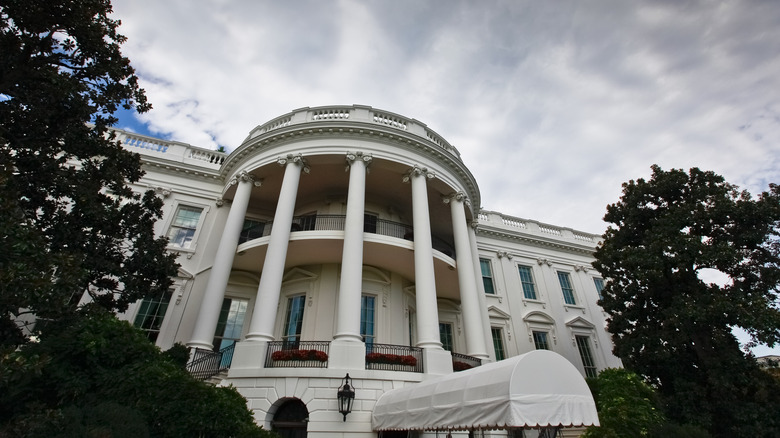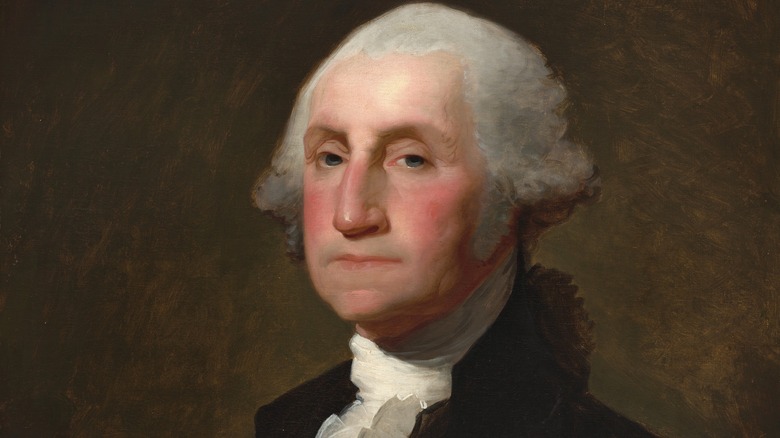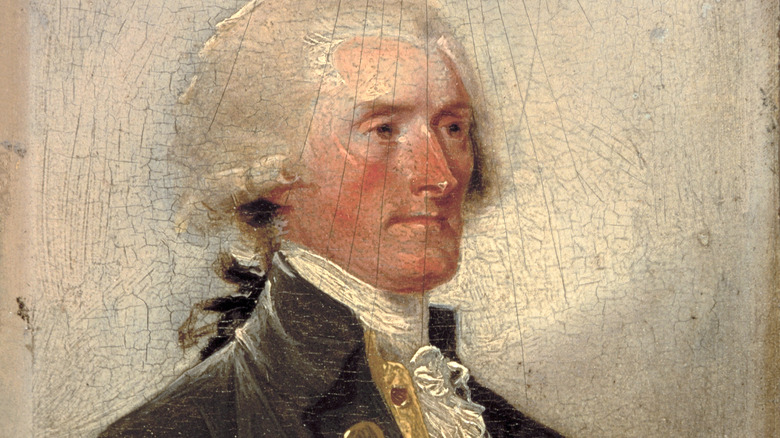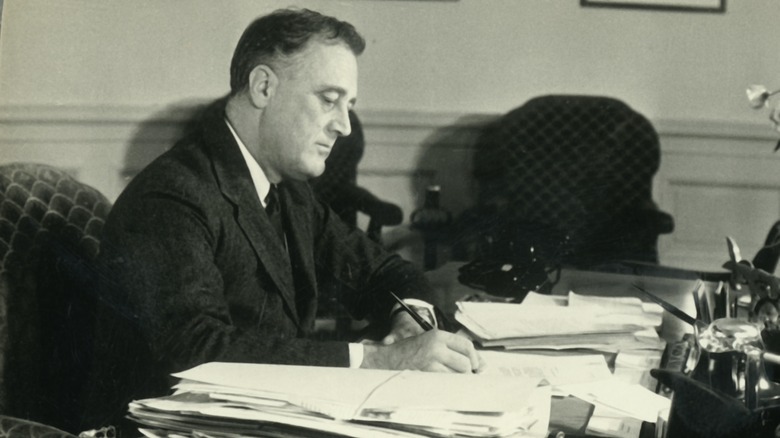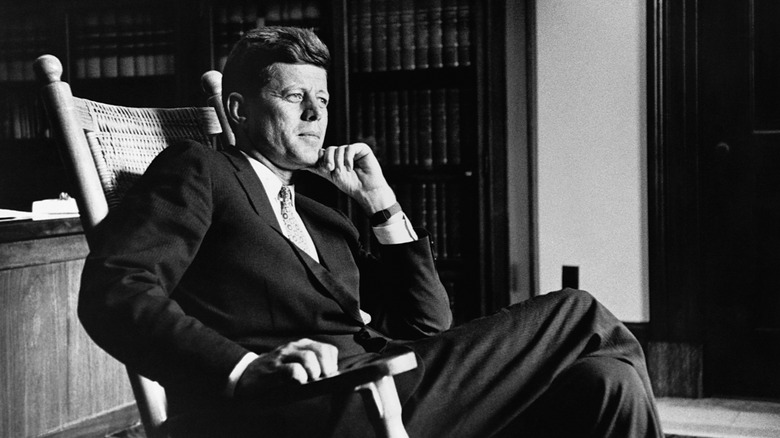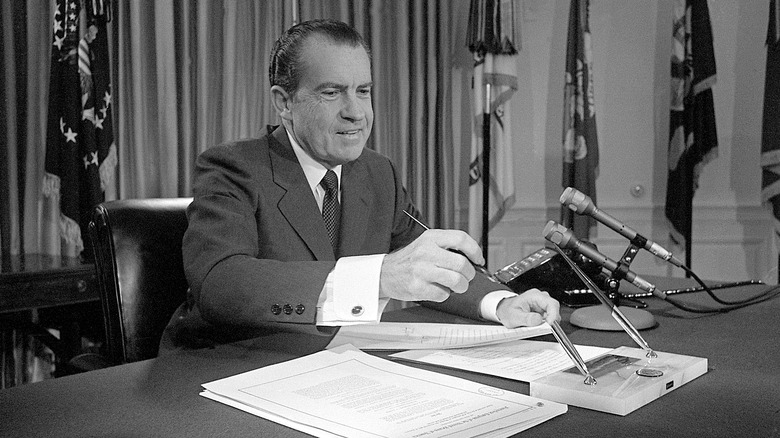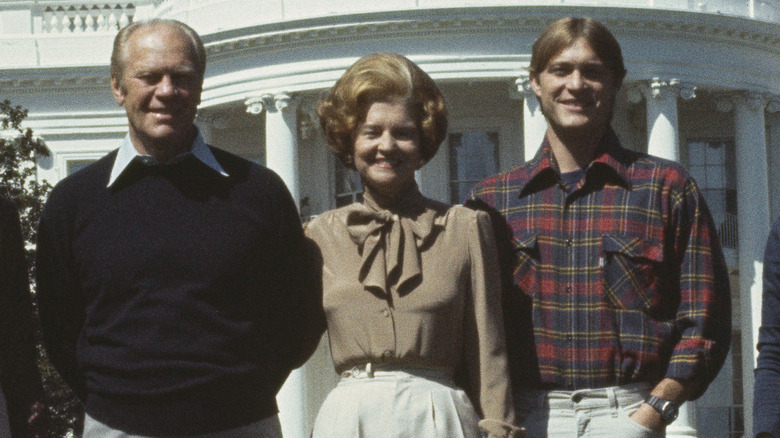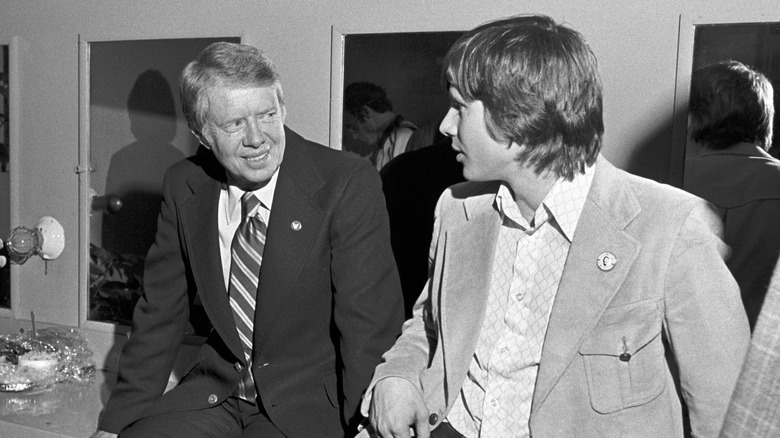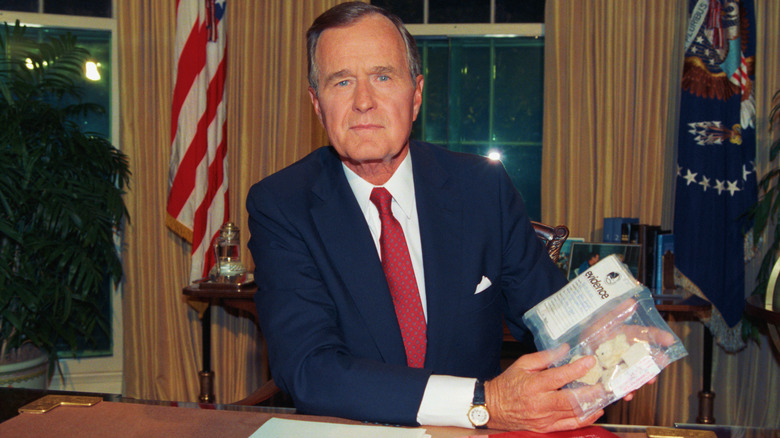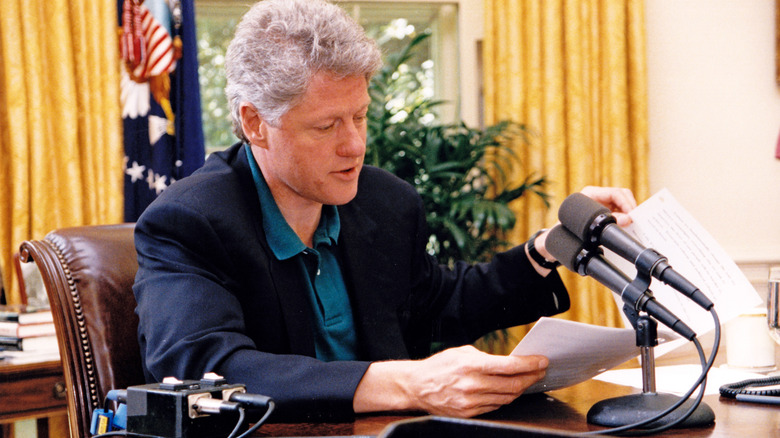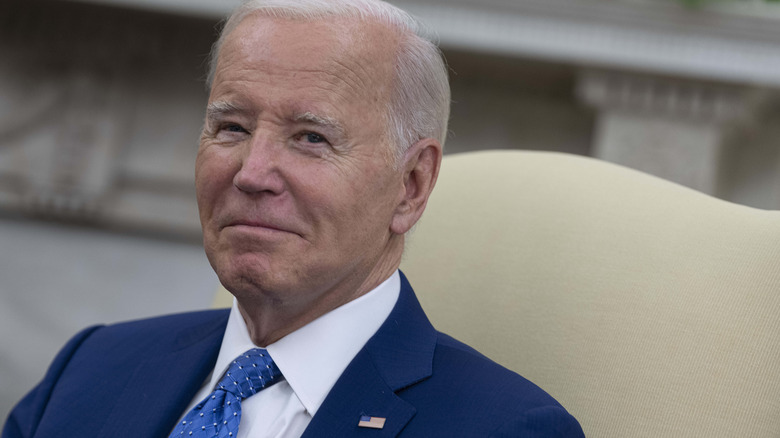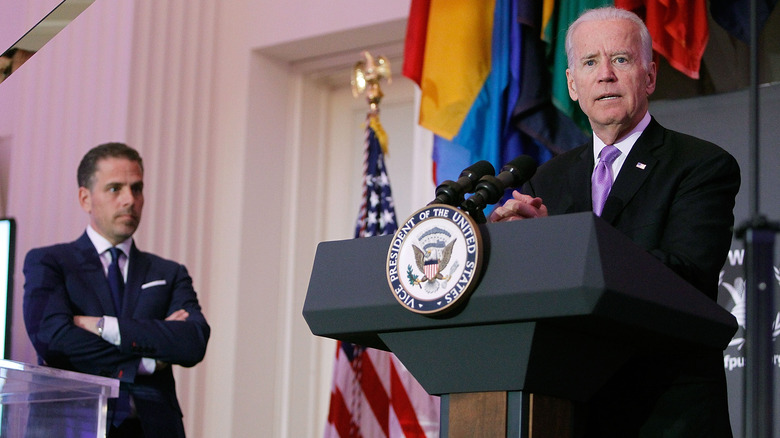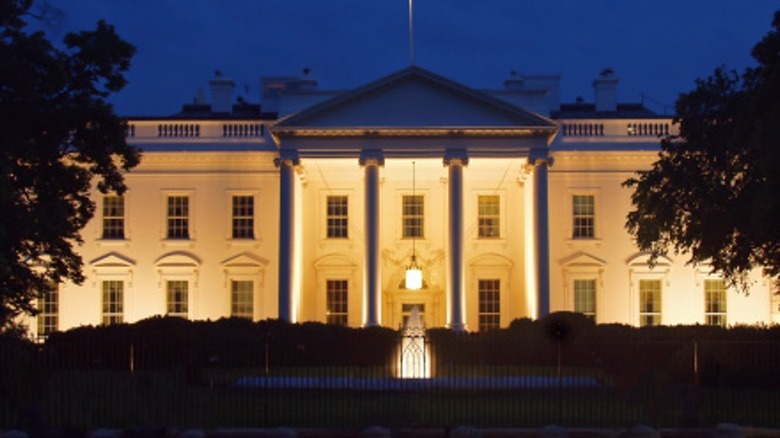The History Of Drugs In The White House
For as long as humans have been aware of the world around us as an oftentimes cruel place, we've been looking to mind-altering substances to help us deal with it. And that's not an exaggeration: Archaeologists have discovered evidence that suggests our ancient ancestors discovered the effects of psychotropic plants somewhere around 200 million years ago. More recently, the Sumerians were using opium around 7,000 years ago, the ancient peoples of China were smoking marijuana 5,000 years ago. In the early 20th century, the U.S. government decided that after so much freedom, people needed to be told they couldn't do things.
The history of drug legislation in the U.S. is complicated, and it only really started around 1909. Drugs, of course, have changed over the years, as has the stigma surrounding them, but even today, it almost goes without saying that it's illegal to have any of them on federal property — even the now-widely accepted marijuana.
Just why that's happened is a complicated lesson in state and federal laws that doesn't need explaining, aside from the fact that as far as the federal government is concerned, things are sort of the same as they were back in the 1970s. That's why we're including marijuana – along with cocaine, opium, laudanum, amphetamines, and other now-controlled substances — in our look back at the long history of drugs in the White House.
George Washington regularly took laudanum
George Washington has been mythologized as the greatest of Americans, but on a more human level, it turns out he had the same fear that haunts many of us: A fear of dying young. That developed after losing not only his 48-year-old father, but two of his siblings when they were only 3 and 12 years old. That said, it's understandable that he did the best he could to stay healthy. That meant a diet that was more functional than indulgent, and it was one particular favorite — Brazil nuts — that John Adams blamed for Washington losing all but one of his teeth in the years leading up to his presidency.
Washington did indulge in some of the best denture technology available to him, but the hippopotamus-tusk dentures that were fitted over his one remaining tooth were painful to wear nearly all the time — including during his presidency. The solution? Laudanum, which was essentially a dose of opium dissolved in alcohol. Also known as an opium tincture, it was effective as a painkiller, but it was also extremely addictive.
Washington's attempts at self-treatment didn't end there. After his death, Mount Vernon cataloged nine medical texts in his library, and noted that he regularly ordered a wide array of medicines from Britain. Besides laudanum, these included Venice treacle, a compound that often contained opium.
Thomas Jefferson, quinine, and opium
Quinine has only recently found itself on a list of banned substances, first barred from some over-the-counter drugs in 1994, then from other products in 2006. Go all the way back to the days of Thomas Jefferson, though, and it was a different story. Jefferson famously believed in the healing power of natural remedies, and relied on Peruvian bark — aka quinine — for relief from the headaches he suffered throughout his life. By 1790, it had ceased to work, though he continued to use the drug at least occasionally during his presidency. Once it stopped working, the only thing that seemed to give him some relief was a little R&R away from the unsurprisingly headache-inducing business of government.
It was only in his later years that he started to rely on laudanum for relief from chronic diarrhea, and there's a footnote here, too. At the same time Jefferson was working on piecing together a whole new country, he was also overseeing the work being done at Monticello. That, of course, was actually being done by slave labor, but among the flowers he ordered planted there were poppies. And yes, they were the kind of poppies that opium comes from. Interestingly, it wasn't until 1992 that anyone really took notice of the fact, and after a nearby drug raid, the governing board at Monticello had all the plants, flowers, and seed packets destroyed.
FDR reportedly used cocaine to treat sinus infections
There's a lot that's been written about Franklin Delano Roosevelt's health before and during his presidency, and that makes it super interesting that history doesn't actually record many key details. Why? His medical records mysteriously disappeared after he died. Still, Steve Gillon — history professor and author of "Pearl Harbor: FDR Leads the Nation Into War" — has a theory that during most of FDR's presidency, his doctors were treating him with cocaine.
Gillon went down the rabbit hole of FDR's medical treatment without really meaning to. According to what he wrote for the Huffington Post, he first got suspicious when he found that on the same day Pearl Harbor was attacked, FDR retreated to a private room with his physician, Dr. Ross McIntire. The visit lasted for 70 minutes — a long time, considering the world outside was burning. So, what happened in there?
Modern medicine would treat chronic sinus infections with antibiotics, but since that wasn't an option in 1941, treatment was aimed at alleviating symptoms. Dr. Jordan S. Josephson is the head of the New York Nasal and Sinus Center, and explained what McIntire — a certified ear, nose, and throat doctor — probably would have done. "Cocaine was the drug of choice for an ENT treating a nasal problem," he said. Application of a cocaine solution — usually via a swab — would have provided immediate if temporary relief, and for the remainder of FDR's presidency, there were similar appointments with the same doctor. It's likely he had no idea what the treatment actually was.
Kennedy needed a shocking number of drugs to function
By the time John F. Kennedy hit the campaign trail, he was physically a mess. In addition to being diagnosed with Addison's disease in 1947 — and being on regular cortisone treatments for that — he was also dealing with back problems and complications from multiple spinal surgeries that included a disk removal in 1944. He suffered from severe allergies and digestive issues, and that's not even mentioning the sort of diseases they usually warn about in junior high school health classes. Put all those things together, and it's not entirely surprising that he relied on a literal cocktail of drugs and physician Max Jacobson, who NYMag says was "the original 'Dr. Feelgood.'"
Kennedy and Jacobson met when the former was on the campaign trail in 1960, and then again after he re-injured his back in 1961. Jacobson administered his cocktails as the Secret Service watched — and no, they weren't thrilled about it. One agent, Larry Newman, described Jacobson as a "bat wing and chicken blood doctor," but the treatments kept JFK going throughout his presidency.
So, what was in those cocktails? A 1962 attempt at an analysis failed to yield any results and Jacobson destroyed JFK's medical records, but Jacobson was known to favor mixtures that included amphetamines, painkillers, and tranquilizers. When Jacobson was raided by New York's Bureau of Narcotics and Dangerous Drugs in the late 1960s, they had a lot of illicit substances to seize.
Grace Slick tried to spike Nixon's tea
Jefferson Airplane's Grace Slick says that contrary to popular belief, "White Rabbit" isn't actually about drugs... at least, not in the obvious way. She told The Wall Street Journal: "It's about following your curiosity. The White Rabbit is your curiosity. Alice follows him wherever he goes. He leads her to drugs, though, and that's why the song was written." (Fun fact: She wrote it in about an hour.)
Slick also has one of the most epic stories ever told about drugs in the White House. Slick had attended an all-girls finishing school called Finch College, and it was also the alma mater of Richard Nixon's daughter, Tricia. The Nixons were in the White House when Tricia decided to host a tea party for her school's prior graduates. The list of invitees included Slick, but since she was on the school's roster under her maiden name, no one realized who she was. For Slick, it was game on.
"So, I called Abbie Hoffman and said, 'Guess where we're going,'" Slick said. "I had planned to spike Richard Nixon's tea with acid. But when Abbie and I were on line, a security guard wouldn't let me in. He said, 'We checked, and you're a security risk.'"
Gerald Ford's son and wife went public
Gerald Ford was sworn in as president in 1974, and it was a little over a year later that his son, Jack, made some candid comments about his own drug use to the Portland Oregonian. He said (via The New York Times), "I've smoked marijuana before, and I don't think that's so exceptional for people growing up in the 1960s." He continued: "The important thing to me is that I do have friends who use drugs, and I don't think that will exclude them as my friends."
He added that he was stepping forward to make the admission to prevent it from surfacing later and potentially impacting his father's political career. As for President Ford's reaction, it was pretty gracious. Ford went on record to say that although he didn't condone drug use, he did laud his son's honesty (via Time).
It's worth noting that Jack wasn't the only member of Ford's White House to speak out about drug use. It was a little over a year after leaving the White House that Betty Ford went public with her own addictions to painkillers and alcohol, addictions that she said had been going on for a long time. In addition to entering a treatment facility, she famously documented her own recovery and helped establish the Betty Ford Clinic. If she was on-site when new patients arrived, she would greet them and remind them: "Hello, my name's Betty Ford, and I'm an alcoholic and drug addict."
Willie Nelson smoked pot with Carter's son
It's one of those stories that could be told without naming names until the end, when everyone listening would simply say, "Of course it was WIllie Nelson." Because seriously... who else? Nelson first told the story of smoking a joint at the White House in his 1988 memoir, and at the time, Nelson wrote that he was joined by a member of the staff. It wasn't until later that a little bit more of the truth went from rumor to confirmed fact, and in the documentary "Jimmy Carter: Rock & Roll President," it's Carter himself who says (via the Los Angeles Times), "That is not exactly true. It was actually one of my sons."
Who would have thought the story was going to get any better? The son in question was Chip Carter (right), who specified that the infamous incident happened when Nelson was at the White House, playing a set during Carter's reelection campaign. "In the break I said, 'Let's go upstairs,'" Chip explained. "We just kept going up 'til we got to the roof, where we leaned against the flagpole at the top of the place and lit one up." And honestly, it sounds kind of amazing: "If you know Washington, the White House is the hub of the spokes — the way it was designed. ... You could sit up there and could see all the traffic coming right at you. It's a nice place up there."
George Bush's drug policy speech was surprisingly controversial
In 1989, President George Bush sat in the Oval Office and looked into the camera to deliver a passionate speech. He held a plastic bag marked "Evidence," saying, "This is crack cocaine, seized a few days ago by drug enforcement agents in a park just across the street from the White House. ... It's as innocent-looking as candy, but it's turning our streets into battle zones." It didn't take long for more to come out about the drug seizure that had happened in a pretty safe, drug-free area of Washington, D.C.
The drug dealer in question was a high school senior named Keith Jackson, whom DEA agents had pressured into meeting in Lafayette Park. He was arrested and sentenced to 10 years in prison, even though a DEA agent admitted to The Washington Post in a 1989 interview that they'd orchestrated the buy to fit in with Bush's plan to claim crack could even be bought near the White House: "We had to manipulate him to get him down there. It wasn't easy." Even the judge remarked at his sentencing (via QZ), "[Bush] used you, in the sense of making a big drug speech." Jackson was only released in 1998.
Even at the time, Bush made his stance very clear. When reporters asked about what had happened, he replied, "The man went there and sold drugs in front of the White House, didn't he? I can't feel sorry for this fellow."
A Clinton-era scandal
Should the use of illicit drugs follow a person forever? That was the question asked by the Clinton administration in 1996, when Secret Service agents went before Congress to testify that, yes, they had given White House employees clearance in spite of background-check flags that included drug use. The decision had been made to grant access to those individuals with a history of drug use, but require stricter-than-normal drug testing in some cases.
It was wildly controversial, with Newt Gingrich going public with statements that accused Bill and Hillary Clinton of being "counterculture McGoverniks" who had largely staffed the White House with people who shared their beliefs. The Clinton administration held fast, though, with some people coming forward to out themselves — including press spokesman Mike McCurry.
He told the Los Angeles Times: "I was a kid in the 1970s. You know, did I smoke a joint from time to time? Of course I did. ... But that doesn't disqualify me from serving here. The point is: If I use drugs now in any way, shape, or form, I'm gone. I'm history." And the administration did fire at least two people for failing drug tests, noting that they had been put in their positions by the previous administration. Still, the controversy wasn't helped any when Clinton granted his brother, Roger, a presidential pardon for a 1985 cocaine-related conviction.
The Biden White House fired five staffers for past marijuana use
In 2021, President Joe Biden's White House found itself facing questions similar to those that had been asked in the Clinton era, and it all went public with a report from The Daily Beast. That story alleged that prospective White House employees were initially told that past marijuana use would be overlooked, but were later fired or forced to resign over those same claims. In a press conference, White House press secretary Jen Psaki said only five employees were impacted. Another informant told The New York Times that there were other deciding factors that came to light when the employees were more closely examined for higher-level clearances.
Psaki also confirmed that the White House would be taking a more lenient stance on recent marijuana use, especially considering the fact that many states were legalizing it. She claimed they were staying in-line with an earlier declaration made as they were in the process of hiring hundreds of White House employees, which was basically saying that on a case-by-case basis — and in regards to positions that didn't require security clearances — recent, recreational marijuana use wasn't a dealbreaker. Anyone hired would not be allowed to use marijuana while employed by the White House, but officials said that they foresaw a new era where (via NBC News) "well-qualified applicants with limited marijuana use will not be barred from serving the American people."
Hunter Biden's addiction
In 2021, Hunter Biden released his memoir, "Beautiful Things." In it, he shared his decades-long struggle against addiction — and that it was an addiction that only strengthened its hold on him after the 2015 loss of his brother, Beau. Anyone who has dealt with addiction in their own family knows how important support is — and Hunter always stressed just how much his father's support meant.
He wrote, "Dad saved me. Left on my own, I'm certain I would not have survived." He recounted stories of loss, profound grief, and overwhelming love. But he also told NPR in an interview, "And even with all of that love, the feeling that overcame that love was my need for another hit, which is a hard thing to live with."
For decades, addiction was something seen as taboo, but in an op-ed piece for The New York Times, Nicholas Kristof put forward the idea that the Biden family was on the verge of doing some serious good by going public with their private struggles. Hunter has described what he hopes to see happen down the road. "I hope we start to talk about [addiction] as a mental health issue," he says. He went on to say he'd written his book because it would "give hopefully some people hope. ... And I don't just mean the people that are stuck at the bottom of the well like I was, but the people that stand at the top of that well and realize unless we go down with the lantern, he's never going to find his way out."
Cocaine was found in the West Wing
In June of 2023, news outlets took a break from the usual mud-slinging that had been coming out of Washington, D.C., when they reported that a dime-sized bag of cocaine had been found in the White House. The lull in mud-slinging didn't last long, with Fox News reporting that bookies — who will famously take bets on literally anything — had Hunter Biden down as a favorite for the source of the cocaine... in spite of the fact that the White House has issued a statement (via Politico) confirming that the entire Biden family had been out of town. White House press secretary Karine Jean-Pierre followed that up with a plea: "Let's let the Secret Service do their job, which we believe and have all the confidence that they will get to the bottom of this episode."
As unthinkable as it might seem, considering just how strict security is in the White House, an unnamed expert also told Politico that it was unlikely they would ever learn just who had brought cocaine into the building, then stored it in a cubby meant for securing electronic devices of visitors. "Even if there were surveillance cameras, unless you were waving it around, it may not have been caught. It's a bit of a thoroughfare. People walk by there all the time."
If you or anyone you know needs help with addiction issues, help is available. Visit the Substance Abuse and Mental Health Services Administration website or contact SAMHSA's National Helpline at 1-800-662-HELP (4357).
